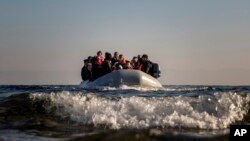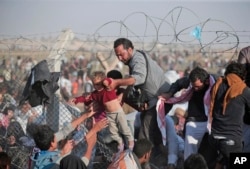The U.N. refugee agency warns the number of people forcibly displaced from their homes is likely to exceed 60 million in 2015.
The UNHCR has released its Mid-Year Trends 2015 report covering global forced displacement during the first six months of this year.
The UNHCR report does not include the hundreds of thousands of refugees who made the perilous journey to Europe across the Mediterranean nor the thousands more seeking refuge from many conflicts around the world during the last half of this year.
But the report says the numbers are staggering and alarming.
Millions
Figures show the global refugee total by mid-2015 had exceeded 20 million, the highest number since 1992; asylum claims had gone up by 78 percent from last year, and the numbers of internally displaced people had jumped by about 2 million to an estimated 34 million.
U.N. refugee spokesman Adrian Edwards told VOA the current levels of forcible displacement, predicted to reach more than 60 million by year’s end, have not been seen since World War II.
“Today, each of us has a one in a 122 chance of becoming a refugee, becoming displaced. And, that is very worrying because what happens to people once they become refugees, today they are staying refugees often for very many years. Some for their lifetime,” Edwards said.
Number of Syrians
He said huge numbers of Syrians have fled war and persecution during the past five years. He said Syrians account for nearly one-quarter of the world’s 20 million refugees and millions more are displaced within the country.
“I would point to the fact that both in Syria, where you have more than six million people internally displaced, but also in many other countries where we are seeing rising internal displacement, this is a big, big worry because internal displacement is often an early warning indicator of future refugee flows,” Edwards said.
The report says voluntary return rates are at their lowest levels in three decades.
The UNHCR said there is little political will on the part of governments to work together to find solutions to the growing refugee and displacement problems.





